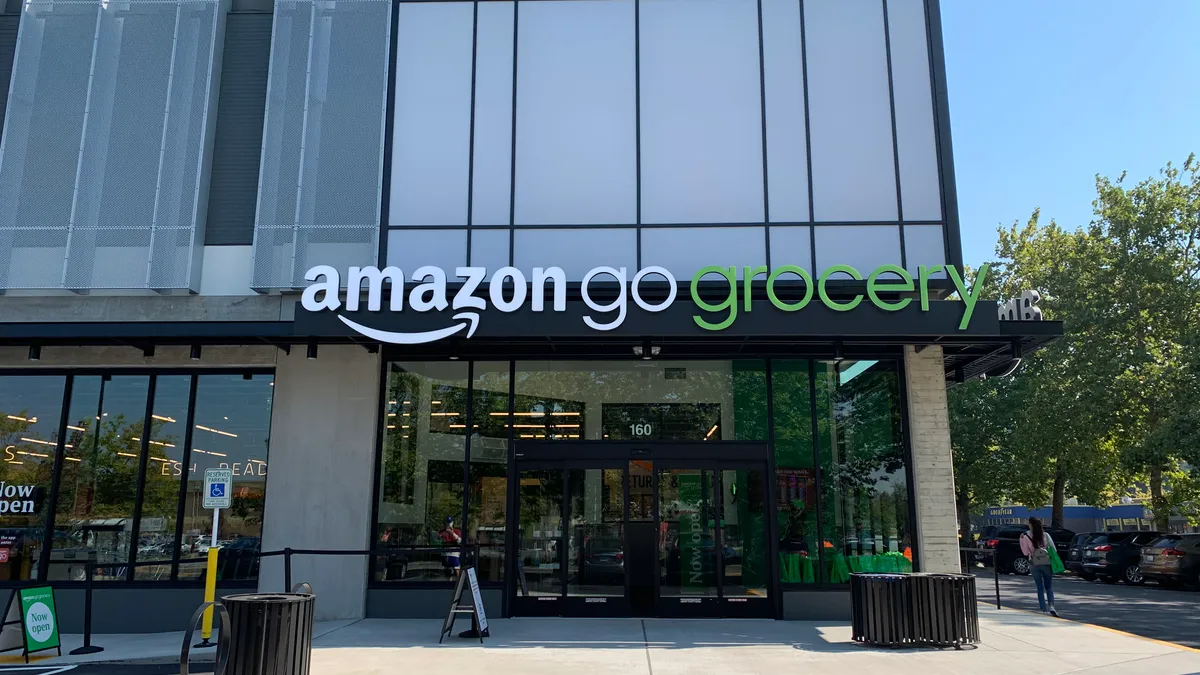Six months after debuting Go Grocery in Seattle, Amazon on Wednesday opened a second location of the cashier-free format in nearby Redmond. While the first spot was located in the Capitol Hill neighborhood close to the office-heavy city center, the new location is situated in a more residential area, bordered by strip-mall shopping and prim suburban neighborhoods.
The just-opened store is a cleaner, more traditional retail box than the first one. Whereas customers to the Seattle location enter in prepared foods and have to take a hard right to reach produce and the store's two tiers of grocery aisles, those who visit the Redmond location enter into the produce department and can shop four long aisles of goods. Prepared foods and meal accompaniments are included in aisles and endcaps rather than carved out in separate sections, giving the shopping experience a more cohesive feel.
There are more baby products in the suburban location, of course. But there are other notable differences that hint at Amazon's evolution as a physical grocer. The produce department feels larger and has more standalone displays than the first store, which has just two large displays of fresh fruits and vegetables. The Redmond store has a selection of hot foods prepared on-site in the concept's first back-of-house kitchen. There's also a lot of private-label goods, including Fresh branded products, Amazon Kitchen heat-and-eat meals and a wide selection of Happy Belly offerings covering everything from spices to frozen bagged produce.
Amazon is also leaning into the bag-it-yourself shopping method, with several countertops available for shoppers to reorganize their goods, bags available in almost every aisle and plenty of signage, including a splashy display at the front of the store showing customers how it's done.
Here's a closer look at the Amazon Go Grocery store in Redmond.
Enter into produce
Similar to many traditional grocery stores, produce greets shoppers right as they walk into the store. It's unclear if the section is actually larger than the one at the first Go Grocery, but it at least feels that way, with more freestanding, light-colored bins. The section features loose fruits and vegetables along with bagged and boxed salad mixes, including 365 and Whole Foods branded selections.
Hot and cold meals
A hot case at the front of the store carries a selection of soups, handhelds, pizza, rotisserie chicken and ribs made in the on-site kitchen. An adjacent aisle carries chilled meals and meal accompaniments covering a wide range of occasions and prep styles. There's grab-and-go sandwiches, pasta salads, family-style Indian meals, chopped peppers and onions, and Amazon Kitchen branded sides like garlic and herb roasted potatoes.
Playing up private label
Amazon's own brands are out in force — in particular its Fresh and Happy Belly brands. Fresh items included baked goods, deli turkey and bacon while Happy Belly touched numerous grocery categories, including eggs, cereal, spices, frozen produce and milk.
Bag as you shop
The Redmond location features more bags and bagging stations throughout the store than the Seattle Go Grocery. A large display at the front of the store sets the message for customers, and nearly every aisle includes a display of bags customers can grab, including free paper bags and a reusable option that sells for 98 cents. The store has several stations dedicated to reorganizing goods, each with a tip to put heavy items at the bottom and delicate goods on top.
Distinct departments
Even though the retail floor is just over 7,000 square feet, Amazon calls out its main departments in large lettering. There's a separate beer, wine and spirits section where customers have to get their ID checked to enter, and where only two customers were allowed at a time to maintain social distancing.
Frequent cleaning and helpful service
Despite Amazon Go's reputation for being a hands-off experience, there were plenty of employees stocking shelves and cleaning surfaces. Workers positioned at the front of the store helped shoppers scan in, and those on the sales floor would ask shoppers if they were finding everything they needed.
Baby products and fast-moving nonfoods
One of the store's four aisles is dedicated to nonfood products. An expanded baby section includes diapers, wipes, packets, formula and personal care products. There's also household cleaners, laundry detergent, batteries, pet food, paper products and disposable utensils.

















